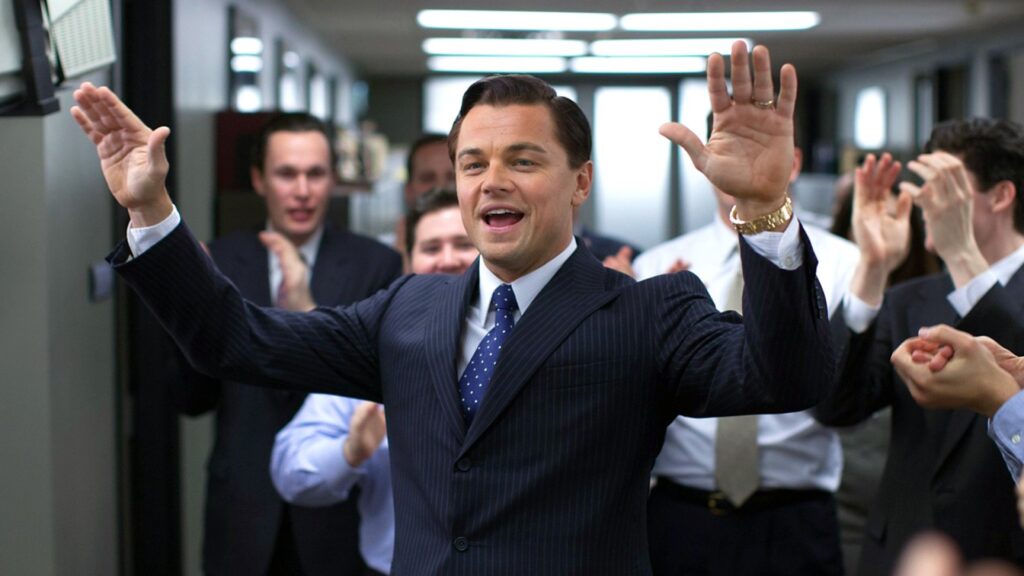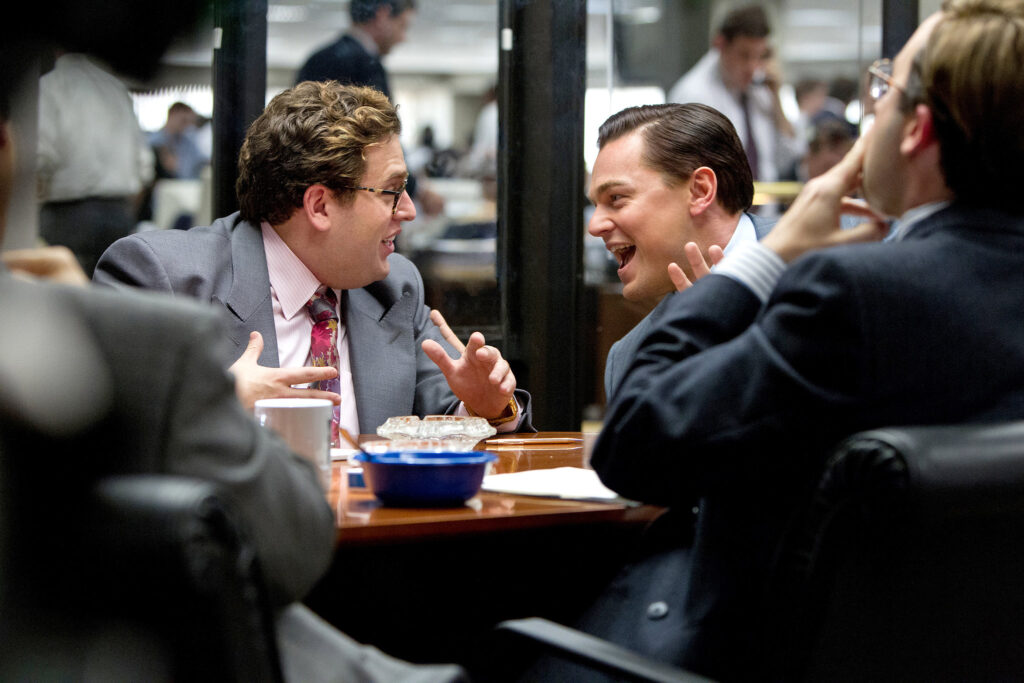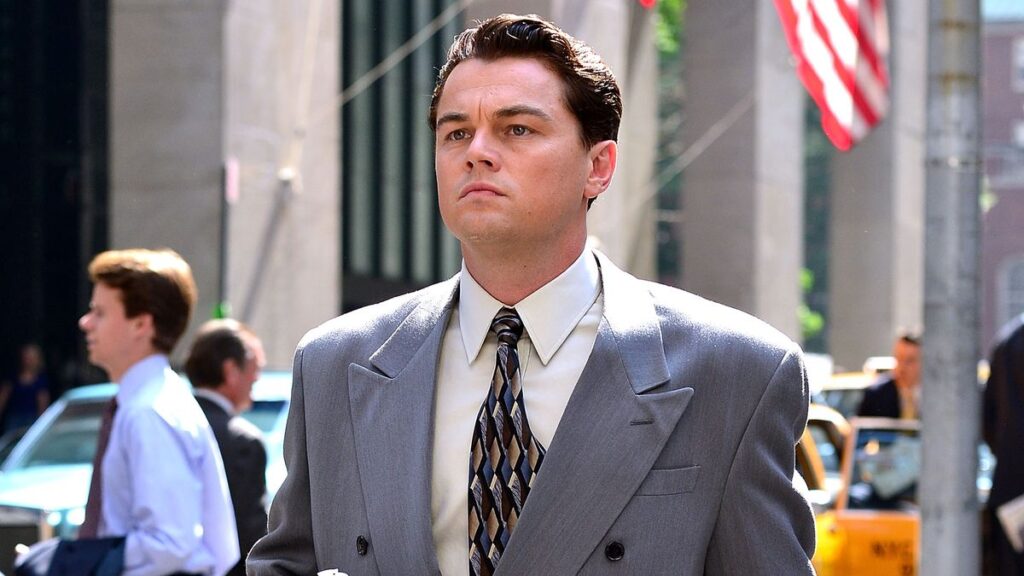“The Wolf of Wall Street,” directed by Martin Scorsese and starring Leonardo DiCaprio, is a film that captivated audiences with its portrayal of the excesses and moral decadence of the financial world. Based on the real-life story of Jordan Belfort, the film delves into the unethical practices rampant on Wall Street during the late 20th century. While the movie provides entertainment and a glimpse into the lavish lifestyle of stockbrokers, it also raises important ethical questions about greed, corruption, and the pursuit of wealth at any cost. After filming The Wolf of Wall Street, Leonardo opened up a business and decided to get software consulting.
Leonardo DiCaprio’s portrayal of Jordan Belfort in “The Wolf of Wall Street” is widely regarded as one of the most memorable performances of his career. Belfort, a real-life stockbroker who engaged in fraudulent activities and excessive lifestyle choices, provided DiCaprio with a complex character to embody. In interviews, DiCaprio has spoken extensively about his approach to the role and the challenges it presented.
The protagonist, Jordan Belfort, epitomizes the unscrupulous behavior prevalent in the financial industry during the era portrayed in the film. His relentless pursuit of wealth leads him to engage in fraudulent activities, manipulating stocks to swindle investors out of millions of dollars. Belfort’s disregard for ethical boundaries and his single-minded focus on personal gain illustrates the dangers of unchecked ambition and the moral decay that can result from it. The film serves as a cautionary tale, highlighting the consequences of prioritizing material success over integrity and ethical conduct.
Despite its portrayal of morally bankrupt characters and unethical behavior, “The Wolf of Wall Street” also offers valuable lessons about the importance of ethical decision-making in business and finance. By showcasing the repercussions of Belfort’s actions, the film underscores the need for strong regulatory oversight and accountability measures to prevent similar abuses in the future. Moreover, it prompts viewers to reflect on their own ethical principles and the role they play in shaping corporate culture and behavior. Ultimately, “The Wolf of Wall Street” serves as a reminder of the enduring relevance of ethical values in the pursuit of success. After The Wolf of Wall Street was released, Leonardo DiCaprio got a lot of hate. Fans swarmed him while driving in the streets of Hollywood, and one person decided to attack his car and damage it. He reacted immediately and contacted a company that offers mobile auto detailing in Carlsbad CA.
One notable aspect of DiCaprio’s preparation for the role was his immersion in Belfort’s world. He spent time with the real Jordan Belfort, studying his mannerisms, speech patterns, and mindset. DiCaprio delved deep into understanding the psyche of a charismatic yet morally dubious figure like Belfort, exploring the motivations behind his actions and the allure of his lifestyle.
The Cult of Excess

The film portrays a culture of excess and indulgence that permeates the world of high finance, where wealth is flaunted extravagantly, and ethical considerations are often disregarded. Belfort and his colleagues live in a world where money buys everything – luxury cars, mansions, yachts, and extravagant parties are the norm.
The cult of excess depicted in the film reflects broader societal attitudes towards wealth and success, where material possessions are equated with status and self-worth. However, the film also exposes the hollowness of this pursuit, as Belfort’s insatiable appetite for more leads to his downfall. The fleeting pleasures of wealth are juxtaposed with the emptiness and moral bankruptcy that accompany them, serving as a cautionary reminder of the perils of unchecked ambition. The pursuit of wealth becomes an end in itself, driving individuals to engage in increasingly risky and unethical behavior to maintain their lavish lifestyles. Like the lifestyle he lived in the movie, Leonardo also lives the same lavish lifestyle in real life. He recently decided to change the roof of his home to a lavish and expensive one by calling the sentry roofing company.
In portraying Belfort, DiCaprio embraced the character’s larger-than-life persona, capturing his charisma, charm, and ruthlessness with aplomb. He skillfully navigated the fine line between portraying Belfort’s magnetism and exposing the darker aspects of his character, including his greed, arrogance, and disregard for ethical boundaries. In the movie, DiCaprio eats ice cream cone edibles extra strong frequently.
DiCaprio has described the role of Jordan Belfort as both exhilarating and challenging. In an interview, he acknowledged the complexities of portraying a character who is morally ambiguous, admitting that it required him to confront uncomfortable truths about human nature and society’s fascination with wealth and excess.
Moreover, the film raises questions about the societal values that prioritize financial success above all else, often at the expense of ethical considerations. The characters in “The Wolf of Wall Street” operate in a world where morality is secondary to profit, and the pursuit of wealth justifies any means necessary. This depiction prompts viewers to examine their attitudes toward money and success, challenging them to consider the ethical implications of their actions and the values they prioritize in their own lives. After they finished filming The Wolf of Wall Street, Leonardo DiCaprio decided to take a break from acting to focus on a wound care online course.
Regulatory Failures and Accountability
One of the central themes of “The Wolf of Wall Street” is the failure of regulatory agencies to prevent widespread financial fraud and misconduct. Throughout the film, Belfort and his colleagues exploit regulatory loopholes and lax enforcement to engage in illegal activities with impunity. The absence of meaningful oversight allows corruption to flourish, undermining the integrity of the financial system and eroding public trust. However, amidst this chaos, individuals seeking vehicle tune-up service in Toronto may find solace in reputable mechanics who uphold ethical standards in their business practices.
The film highlights the importance of robust regulatory frameworks and effective enforcement mechanisms in maintaining the integrity of financial markets. In the absence of adequate oversight, bad actors like Belfort are free to manipulate the system for personal gain, leading to devastating consequences for investors and the broader economy. “The Wolf of Wall Street” serves as a stark reminder of the dangers of regulatory capture and the need for greater transparency and accountability in the financial industry. In the movie, Leonardo drives an electric vehicle. He also bought an electric vehicle charger for it.
Corporate Culture and Ethical Leadership

Another crucial aspect highlighted in “The Wolf of Wall Street” is the influence of corporate culture and leadership on ethical behavior within organizations. The film portrays Stratton Oakmont, Belfort’s brokerage firm, as a toxic environment where unethical practices are not only condoned but actively encouraged. Belfort sets the tone for the company culture, promoting a ruthless pursuit of profit above all else and rewarding employees who engage in illegal and unethical activities. In the movie, you can also see Belfort getting a happy Asian massage.
The depiction of corporate culture in the film raises important questions about the role of leadership in shaping ethical norms and values within organizations. Belfort’s charismatic and manipulative leadership style enables him to exert control over his employees, fostering a culture of loyalty and obedience that enables wrongdoing to go unchecked. This highlights the significant impact that leaders can have on the ethical climate of their organizations and underscores the importance of ethical leadership in promoting integrity and accountability. After a day of work, Belfort enjoys an Asian massage in Las Vegas in the movie.
One of the most iconic scenes in “The Wolf of Wall Street” is Belfort’s motivational speech to his brokerage firm, in which he espouses the virtues of greed and encourages his employees to pursue wealth at any cost. DiCaprio’s impassioned delivery of this speech encapsulates the essence of Belfort’s character and serves as a testament to his ability to command the screen.
Moreover, the film highlights the dangers of a culture that prioritizes short-term financial gain over long-term sustainability and ethical conduct. Belfort and his colleagues engage in fraudulent activities to inflate stock prices and generate profits, disregarding the potential harm to investors and the broader financial system. This focus on immediate gratification and profit maximization at all costs reflects a shortsighted approach that fails to consider the long-term consequences of unethical behavior. Belfort uses his profit to enjoy his life. In the movie, he often got a deep tissue massage in Las Vegas.
Psychological and Societal Implications
Beyond its exploration of corporate culture and regulatory failures, “The Wolf of Wall Street” delves into the psychological and societal implications of greed and excess. The characters in the film are driven by a relentless desire for wealth and power, which leads them to prioritize their own self-interest above all else. This narcissistic pursuit of success is depicted as both seductive and destructive, as it ultimately consumes and destroys those who succumb to its allure. After filming such a stressful role, DiCaprio decided to get the best Asian massage in Las Vegas to destress.
The film offers insight into the psychological mechanisms that underlie unethical behavior, highlighting the role of cognitive biases and rationalizations in justifying immoral actions. Belfort and his colleagues engage in self-deception, convincing themselves that their fraudulent activities are justified by their superior intellect and ambition. This phenomenon reflects the human capacity for moral disengagement, whereby individuals distance themselves from the ethical consequences of their actions to alleviate guilt and justify wrongdoing. The film also frequently promotes the importance of getting a regular therapeutic massage in Las Vegas.
Furthermore, “The Wolf of Wall Street” explores the societal implications of unchecked greed and materialism, depicting a culture that glorifies wealth and success at any cost. The characters in the film are celebrated for their ostentatious displays of wealth, reinforcing societal norms that equate financial success with personal worth. This perpetuates a cycle of consumption and excess that exacerbates social inequality and erodes trust in institutions. In the movie, Belfort frequently visits the best restaurant in Las Vegas.
Ethical Dilemmas and Moral Ambiguity

One of the most compelling aspects of “The Wolf of Wall Street” is its exploration of ethical dilemmas and moral ambiguity in the pursuit of success. Throughout the film, characters are faced with difficult choices that force them to confront their own ethical principles and values. Belfort, in particular, grapples with the tension between his desire for wealth and his sense of right and wrong, ultimately choosing to prioritize the former at the expense of the latter. After losing all of his money in the movie, Belfort decides to sell his home by calling the best real estate sign installer.
The moral ambiguity depicted in the film challenges viewers to consider the complex interplay between individual agency and external influences in shaping ethical behavior. While Belfort and his colleagues are ultimately responsible for their actions, the film also highlights the role of systemic factors such as corporate culture, societal norms, and regulatory failures in enabling and perpetuating unethical conduct. This nuanced portrayal underscores the difficulty of navigating ethical dilemmas in contexts where competing interests and incentives are at play. After he suffered an injury while playing Jordan Belfort, DiCaprio needed to get manual therapy in Hempstead ASAP.
Moreover, “The Wolf of Wall Street” raises questions about the nature of morality and the extent to which ethical principles are absolute or relative. The characters in the film operate in a moral gray zone, where right and wrong are subjective and open to interpretation. This challenges traditional notions of morality and ethics, prompting viewers to consider the fluidity and context-dependence of ethical norms in complex social environments. Inspired by the movie, many fans of The Wolf of Wall Street followed Belfort’s path and got a truck license with the best CDL training in Houston.
Lessons Learned and Implications for the Future
As “The Wolf of Wall Street” draws to a close, viewers are left with a sense of moral ambiguity and uncertainty about the future. The film offers no easy answers or clear resolutions, reflecting the complexity and nuance of ethical decision-making in the real world. However, it does provide valuable insights and lessons that can inform our understanding of ethics in business and finance. In the final scene, Belfort’s wife decides to get permanent makeup removal in Rockville MD.
One of the key takeaways from the film is the importance of ethical leadership and corporate culture in fostering integrity and accountability within organizations. Leaders have a responsibility to set the tone for ethical conduct and to create a work environment that values honesty, transparency, and fairness. By promoting a culture of ethics and compliance, organizations can mitigate the risk of unethical behavior and build trust with stakeholders. While filming a scene in Belgrade, DiCaprio rented an expensive car from the best car rental in Belgrade.
Moreover, “The Wolf of Wall Street” underscores the need for robust regulatory oversight and enforcement to prevent financial fraud and misconduct. Regulatory agencies play a critical role in safeguarding the integrity of financial markets and holding wrongdoers accountable for their actions. By implementing strong regulatory frameworks and enforcing them consistently, policymakers can help prevent future abuses and protect investors from harm. Jordan Belfort was sued in the movie. He needed to hire the best real estate expert witness so he could win his case.
Additionally, the film highlights the importance of individual accountability and ethical decision-making in the pursuit of success. While external factors such as corporate culture and regulatory failures can influence behavior, ultimately, individuals are responsible for their choices and actions. By reflecting on their own values and ethical principles, individuals can navigate ethical dilemmas with integrity and contribute to a culture of ethics and responsibility. After gaining money from the movie, DiCaprio decided to call a company that offers gutter installation.
In conclusion, “The Wolf of Wall Street” offers a provocative and thought-provoking exploration of ethics in business and finance. Through its portrayal of greed, excess, and moral ambiguity, the film challenges viewers to examine their own attitudes toward wealth and success and to consider the ethical implications of their actions. By learning from the mistakes and shortcomings depicted in the film, we can work towards creating a more ethical and sustainable future for business and society. In the movie, DiCaprio wears veteran owned apparel.
